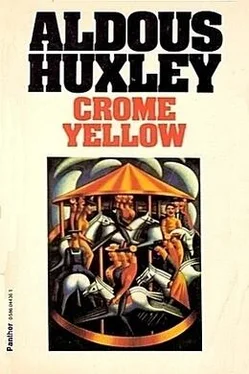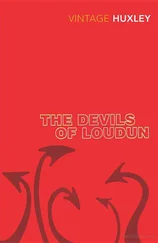"In hell, it seems," said Priscilla, reading in her Sunday paper, "the children amuse themselves by flaying lambs alive."
"Ah, but, dear lady, that's only a symbol," exclaimed Mr. Barbecue–Smith, "a material symbol of a h–piritual truth. Lambs signify…"
"Then there are military uniforms," Mr. Scogan went on. "When scarlet and pipe–clay were abandoned for khaki, there were some who trembled for the future of war. But then, finding how elegant the new tunic was, how closely it clipped the waist, how voluptuously, with the lateral bustles of the pockets, it exaggerated the hips; when they realized the brilliant potentialities of breeches and top–boots, they were reassured. Abolish these military elegances, standardise a uniform of sack–cloth and mackintosh, you will very soon find that…"
"Is anyone coming to church with me this morning?" asked Henry Wimbush. No one responded. He baited his bare invitation. "I read the lessons, you know. And there's Mr. Bodiham. His sermons are sometimes worth hearing."
"Thank you, thank you," said Mr. Barbecue–Smith. "I for one prefer to worship in the infinite church of Nature. How does our Shakespeare put it? 'Sermons in books, stones in the running brooks.'" He waved his arm in a fine gesture towards the window, and even as he did so he became vaguely, but none the less insistently, none the less uncomfortably aware that something had gone wrong with the quotation. Something—what could it be? Sermons? Stones? Books?
Mr. Bodiham was sitting in his study at the Rectory. The nineteenth–century Gothic windows, narrow and pointed, admitted the light grudgingly; in spite of the brilliant July weather, the room was sombre. Brown varnished bookshelves lined the walls, filled with row upon row of those thick, heavy theological works which the second–hand booksellers generally sell by weight. The mantelpiece, the over–mantel, a towering structure of spindly pillars and little shelves, were brown and varnished. The writing–desk was brown and varnished. So were the chairs, so was the door. A dark red–brown carpet with patterns covered the floor. Everything was brown in the room, and there was a curious brownish smell.
In the midst of this brown gloom Mr. Bodiham sat at his desk. He was the man in the Iron Mask. A grey metallic face with iron cheek–bones and a narrow iron brow; iron folds, hard and unchanging, ran perpendicularly down his cheeks; his nose was the iron beak of some thin, delicate bird of rapine. He had brown eyes, set in sockets rimmed with iron; round them the skin was dark, as though it had been charred. Dense wiry hair covered his skull; it had been black, it was turning grey. His ears were very small and fine. His jaws, his chin, his upper lip were dark, iron–dark, where he had shaved. His voice, when he spoke and especially when he raised it in preaching, was harsh, like the grating of iron hinges when a seldom–used door is opened.
It was nearly half–past twelve. He had just come back from church, hoarse and weary with preaching. He preached with fury, with passion, an iron man beating with a flail upon the souls of his congregation. But the souls of the faithful at Crome were made of india–rubber, solid rubber; the flail rebounded. They were used to Mr. Bodiham at Crome. The flail thumped on india–rubber, and as often as not the rubber slept.
That morning he had preached, as he had often preached before, on the nature of God. He had tried to make them understand about God, what a fearful thing it was to fall into His hands. God—they thought of something soft and merciful. They blinded themselves to facts; still more, they blinded themselves to the Bible. The passengers on the "Titanic" sang "Nearer my God to Thee" as the ship was going down. Did they realise what they were asking to be brought nearer to? A white fire of righteousness, an angry fire…
When Savonarola preached, men sobbed and groaned aloud. Nothing broke the polite silence with which Crome listened to Mr. Bodiham—only an occasional cough and sometimes the sound of heavy breathing. In the front pew sat Henry Wimbush, calm, well–bred, beautifully dressed. There were times when Mr. Bodiham wanted to jump down from the pulpit and shake him into life,—times when he would have liked to beat and kill his whole congregation.
He sat at his desk dejectedly. Outside the Gothic windows the earth was warm and marvellously calm. Everything was as it had always been. And yet, and yet…It was nearly four years now since he had preached that sermon on Matthew xxiv. 7: "For nation shall rise up against nation, and kingdom against kingdom: and there shall be famines, and pestilences, and earthquakes, in divers places." It was nearly four years. He had had the sermon printed; it was so terribly, so vitally important that all the world should know what he had to say. A copy of the little pamphlet lay on his desk—eight small grey pages, printed by a fount of type that had grown blunt, like an old dog's teeth, by the endless champing and champing of the press. He opened it and began to read it yet once again.
"'For nation shall rise up against nation, and kingdom against kingdom: and there shall be famines, and pestilences, and earthquakes, in divers places.'
"Nineteen centuries have elapsed since Our Lord gave utterance to those words, and not a single one of them has been without wars, plagues, famines, and earthquakes. Mighty empires have crashed in ruin to the ground, diseases have unpeopled half the globe, there have been vast natural cataclysms in which thousands have been overwhelmed by flood and fire and whirlwind. Time and again, in the course of these nineteen centuries, such things have happened, but they have not brought Christ back to earth. They were 'signs of the times' inasmuch as they were signs of God's wrath against the chronic wickedness of mankind, but they were not signs of the times in connection with the Second Coming.
"If earnest Christians have regarded the present war as a true sign of the Lord's approaching return, it is not merely because it happens to be a great war involving the lives of millions of people, not merely because famine is tightening its grip on every country in Europe, not merely because disease of every kind, from syphilis to spotted fever, is rife among the warring nations; no, it is not for these reasons that we regard this war as a true Sign of the Times, but because in its origin and its progress it is marked by certain characteristics which seem to connect it almost beyond a doubt with the predictions in Christian Prophecy relating to the Second Coming of the Lord.
"Let me enumerate the features of the present war which most clearly suggest that it is a Sign foretelling the near approach of the Second Advent. Our Lord said that 'this Gospel of the Kingdom shall be preached in all the world for a witness unto all nations; and then shall the end come.' Although it would be presumptuous for us to say what degree of evangelisation will be regarded by God as sufficient, we may at least confidently hope that a century of unflagging missionary work has brought the fulfilment of this condition at any rate near. True, the larger number of the world's inhabitants have remained deaf to the preaching of the true religion; but that does not vitiate the fact that the Gospel HAS been preached 'for a witness' to all unbelievers from the Papist to the Zulu. The responsibility for the continued prevalence of unbelief lies, not with the preachers, but with those preached to.
"Again, it has been generally recognised that 'the drying up of the waters of the great river Euphrates,' mentioned in the sixteenth chapter of Revelation, refers to the decay and extinction of Turkish power, and is a sign of the near approaching end of the world as we know it. The capture of Jerusalem and the successes in Mesopotamia are great strides forward in the destruction of the Ottoman Empire; though it must be admitted that the Gallipoli episode proved that the Turk still possesses a 'notable horn' of strength. Historically speaking, this drying up of Ottoman power has been going on for the past century; the last two years have witnessed a great acceleration of the process, and there can be no doubt that complete desiccation is within sight.
Читать дальше











